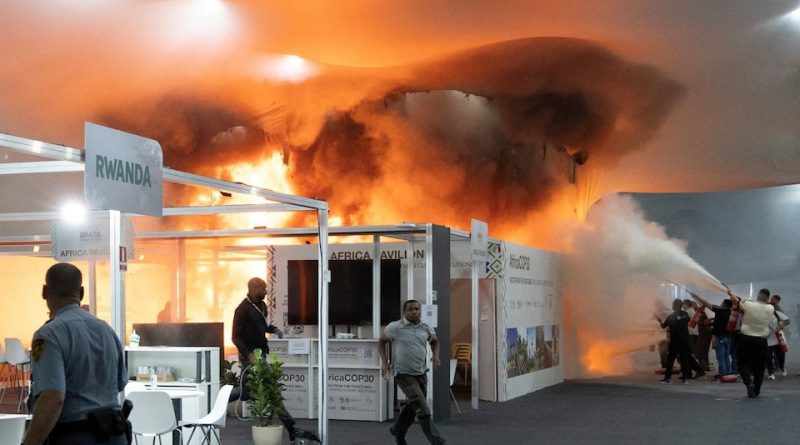Fire Disrupts COP30 Climate Talks as UN Chief Calls for Flexible Deal
Belem – A fire briefly disrupted the COP30 climate summit in Belem, forcing an evacuation of thousands of delegates as negotiators were working to finalize a deal aimed at strengthening global climate commitments and accelerating international climate action.
The incident occurred just as countries were entering a crucial phase of talks, with less than a day left to reach consensus on issues such as climate finance, fossil fuel transition, and adaptation support for vulnerable nations.
Earlier in the day, the UN Secretary-General urged negotiators to show flexibility and unity, emphasizing that the world was looking for a clear signal that governments were ready to move beyond promises and take concrete steps toward major climate reforms.
He welcomed calls from several nations seeking clarity on the global approach to reducing dependence on fossil fuels, one of the most divisive and long-running issues at climate summits.
The fire reportedly began inside an exhibition pavilion where security cameras captured flames spreading rapidly across an interior fabric lining before responders acted swiftly to contain and extinguish the blaze.
Thirteen individuals were treated for smoke inhalation, while early assessments pointed to electrical equipment, possibly a microwave, as the likely cause of the fire, which was brought under control within minutes.
Security teams evacuated the venue and formed barriers to prevent re-entry, creating temporary uncertainty about when negotiations would resume and whether late-night consultations could continue safely.
Officials indicated that formal negotiations might not restart until the following morning, although discussions between the presidency and key negotiating blocs could continue depending on the condition of the venue.
The talks had already missed a self-imposed mid-week deadline to finalise agreement on increasing global climate finance and shaping a shared path for reducing reliance on fossil fuels in the decades ahead.
Brazil, the summit’s host, circulated a draft proposal that included several elements of a possible deal but excluded a detailed roadmap for phasing out or transitioning away from fossil fuels, a key demand for many countries.
The draft suggested tripling funds for climate adaptation by 2030, compared to 2025 levels, but it left open the question of whether wealthy nations, development banks, or private investors would provide the financing.
Some negotiators said they had been reviewing the draft shortly before the evacuation, while others noted that the text had not yet reached all participating countries, reflecting the uneven pace of negotiations.
It is common during COP gatherings for the presidency to negotiate with smaller groups before presenting a final text to all nations for approval, often pushing talks into late-night sessions.
This year’s talks have been dominated by disagreements over fossil fuels and climate finance, exposing sharp divisions between wealthy countries, major producers, and nations most vulnerable to climate impacts.
Dozens of nations, following Brazil’s lead, have pushed strongly for a clear fossil-fuel transition roadmap to give direction to global energy policy and provide consistency for developing countries.
Several producing nations, however, continue to resist binding commitments, arguing that energy security and economic stability must remain central to the global discussion on climate solutions.
Another major challenge is securing long-term adaptation funding, as many developing nations express frustration over delays, unmet promises, and what they describe as a widening gap between needs and available financial support.
Leaders from climate-vulnerable nations stressed that communities are already suffering heavy losses from powerful storms, rising temperatures, and warming seas, urging negotiators to deliver a meaningful outcome for those most at risk.
Officials from some wealthier nations acknowledged the importance of adaptation financing but said they lacked authorization to commit to new targets without consultations back home.
As negotiations resume, the pressure continues to build for nearly 200 countries to find common ground and send a strong signal that global cooperation on climate action remains intact despite persistent divisions and unexpected disruptions.



